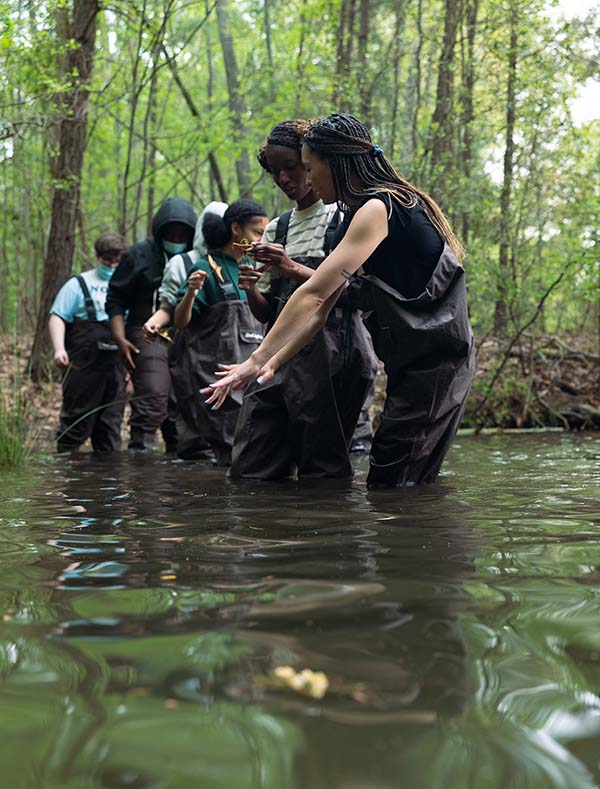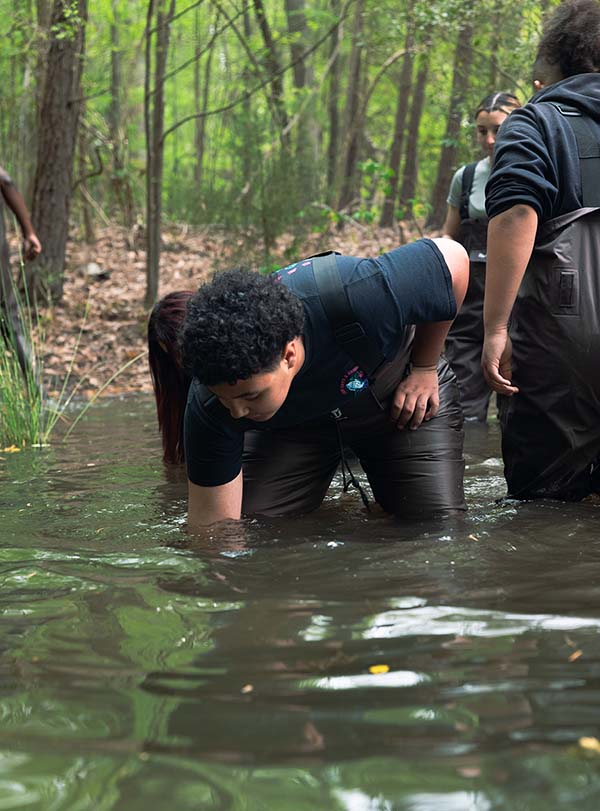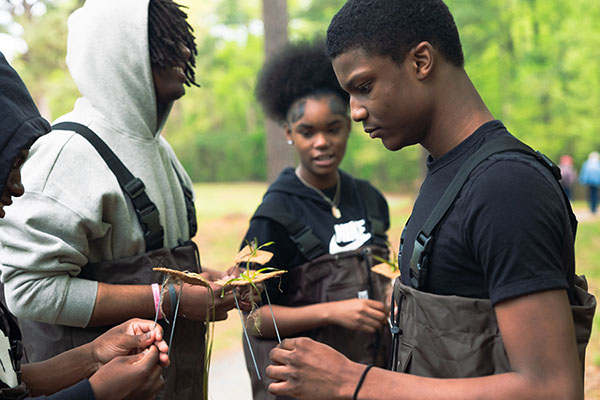Partnership continues to help students learn science at The Mariners' Museum and Park
Posted: April 22, 2024
Donning waders to plant eelgrass in Mariners' Lake, conducting water quality testing and learning about various kinds of fish using a simulation were all part of a school day for Denbigh High School ninth graders on April 17.
Thousands of NNPS biology and environmental science students have participated in an ongoing experiential learning program through a partnership with The Mariners' Museum and Park that continues to teach them. A three-year grant from the National Oceanic and Atmospheric Administration and funded through the Bay Watershed Education and Training program has allowed students to participate in the large-scale watershed restoration project as a learning lab.
Museum officials are committed to continuing the program, which other local school divisions have joined since NNPS began participating in 2021.
As Denbigh science teacher Kathryn Hamilton's environmental science students took their turn, science educators from The Mariners' Museum informed them every step of the way through the three educational stations of activities.
Aside from the obvious appeal of leaving school for a brief adventure, there are real advantages to this engagement opportunity.
"What they're doing here ties directly into what we're learning about," Hamilton said. "Right now we're working on ecosystems and we're talking about how different ecosystems interact and what abiotic and biotic things are. Next unit we'll be talking about invasive species and topics like that.
"So it literally ties directly into material we're doing and material we have talked about in class. But some of the tests that they were able to do are not tests that I can do in class with them."
Project Director Andrea Rocchio, senior educator for science at The Mariners' Museum and Park, and Sabrina Jones, senior director of advancement, explained the long-term benefits of introducing students and teachers to the park and museum so that they might return to explore all that the museum and park have to offer. The Mariners' Museum's B-WET program is designed to create environmental stewards and build a sense of belonging in the community for the students.
This was illustrated as numerous educators explained steps to students and helped them prepare and work through the stations. Individual interactions, conversations and tips and tricks were sprinkled throughout.
Within minutes of getting off the school bus, students were pulling on waders and putting eelgrass onto coconut fiber and a small metal stake. They headed down to the lake where two staffers in the water assisted each student in finding a smooth and suitable spot on the bottom of the shallow section of lake and planting their eelgrass.
Back on land, students next learned the intricacies of water quality testing in small groups with a worksheet to fill out.
Using samples from Mariners' Lake, they were guided in conducting five tests and discussing what the results meant. Water was tested for pH, dissolved oxygen, temperature, turbidity and salinity.
"It's very difficult to do turbidity and the dissolved oxygen in class," Hamilton said. "But they were able to go right, we talked about this. And hopefully, the next time they see it on a test they'll say right, I did that. I remember this because I did it.
"Doing things hands-on stick into your memory better than just hearing it and writing it down and doing homework on it simply because it triggers in their mind. When you do something, it works better for memory."
At the last station, students learned details about the submerged wreck of the Monitor battleship and how it forms an artificial reef to serve as a fish habitat off the coast of Cape Hatteras, North Carolina. They used fishing poles to fish for a series of plastic fish labeled with details on specific fish species to learn about invasive varieties, all while avoiding the artifacts that are to be left alone when plying the waterways.
One female student was continuously reeling in fish while a boy further down the line said: "We're starving over here" after they'd been reminded that this friendly competition could have been more dire if they were trying to fulfill their dietary needs.
Experiences like this one give teachers opportunities to do things with students that they wouldn't normally be able to do, according to Hamilton.
"We're treating it almost as bio prep so that when they go to biology hopefully next year, they'll have seen this information before and they'll remember it a little better before they take the biology SOL," Hamilton said.









